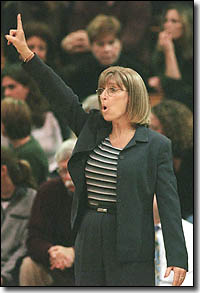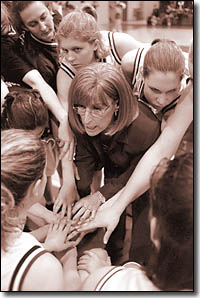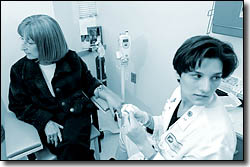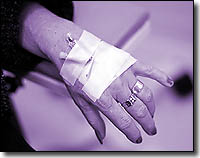Coach Turns Fight for Life Into Lesson
Editors note: Womens basketball Coach Kathy Delaney-Smith was diagnosed with breast cancer in December. As part of her commitment to education, both of her students and of the broader community, Delaney-Smith has decided to be public about her disease, its treatment, and its effect on her life. This is the first of three articles highlighting her story.

Kathy Delaney-Smith spied the baseball hat shed been looking for at the shop at the Dana-Farber Cancer Institute. It had hair attached, for use by cancer patients made bald by their treatment.
“Here,” she said to a nearby friend as she pulled off her blonde wig and reached for the hat. “Hold my hair.”
The episode is vintage Delaney-Smith: funny, open, and a bit in your face. Its how she deals with her personal relationships, its how shes coached the Harvard Womens Basketball Team to six Ivy League titles over 18 years, and its how shes facing the breast cancer she was diagnosed with in December.
“Shes not someone who hides things,” said Maureen MacNeil, Delaney-Smiths roommate from their days at Bridgewater State College and the friend in the shop that day. “Shell put things right out there, before you have a chance to skirt the issue. Thats sort of how shes dealing with her cancer.”
While some might want to keep the news of their illness private, Delaney-Smith said she rejected that option for several reasons. First, in her public role as a basketball coach, interacting closely with her players and striding the sidelines during games, it would be a difficult secret to keep.

Second, though, is the opportunity that comes with her illness. Being open about her disease gives her a chance to educate the broader community about breast cancer and about the critical importance of early detection in fighting the disease.
And her players are getting a lesson in life.
“I just think shes a great example for the players to see every day,” said Assistant Coach Patricia Brown 87, who played for Delaney-Smith for four years as a Harvard undergraduate. “It has to be a motivator for them. How can you be tired during a practice when your coach is dealing with this?”
A December Surprise
Delaney-Smiths cancer turned up during a routine exam in early December. A lump in her right breast raised immediate concerns.
The next day, Delaney-Smith received a mammogram and an ultrasound. After the tests, she was immediately ushered in to see a cancer specialist and then sent to Beth Israel Deaconess Medical Center for a core biopsy, in which a part of the tumor is removed for examination.
Though the hospital personnel assured her that nothing was certain until the tests were completed, Delaney-Smith said she had a feeling the lump was cancerous.

“I knew I had cancer, everybody was dancing too fast for it not to be,” she said.
The following day, the test results confirmed her suspicions. She had stage-two breast cancer, meaning the tumor was larger than two centimeters, but had not yet spread to other parts of her body. The lump was removed on Dec. 21.
Today, Delaney-Smith is in the midst of the next stage of her treatment chemotherapy administered once every three weeks. She says the chemo not only makes her sick for days afterward, it also has sapped her energy and sometimes makes it a challenge to complete her usual routine which includes daily practices and weekly games, both home and away.
Delaney-Smith has two more chemo treatments to complete, followed by weeks of daily doses of radiation. After that, shell be on the drug tamoxifen for five years to prevent recurrence.
Breast cancer is second only to lung cancer as a cause of cancer deaths in women, according to JoAnn Farina, Cancer Control Team leader for the American Cancer Societys Massachusetts Bay Region. Nationwide, 182,000 new cases of breast cancer are expected to be diagnosed this year, and more than 40,000 women are projected to die from the disease.
Delaney-Smiths prognosis is good, largely because the disease was caught at an early stage.
“Early detection makes all the difference in the world,” Farina said.
Shooting Hoops

Though Delaney-Smith uses humor to deal with her illness and to put others at ease, that doesnt mean she hasnt had moments of introspection. Though finding out about her own illness was a shock, cancer isnt a stranger to her. She lost both her parents to cancer, her mother to bone cancer and her father to lung cancer.
Still, she hasnt dwelled on her parents deaths or on possible connections to her own condition. She said she tries to stay positive and to deal with todays troubles.
“I didnt have a fear of death, I was shocked. It was more surreal to me than real,” Delaney-Smith said when asked her thoughts on hearing the diagnosis. “I guess I didnt allow myself to get all emotional, like I might have with a longer process. I had to get the surgery done. I had coaching to do, there were insurance issues.
“I do remember going out for a walk and saying aloud, You have breast cancer. It didnt seem real to me.”
It was difficult, she said, telling her husband, Francis Smith, and her 13-year-old son, Jared. They were both shocked.
“I was scared to death to tell my son,” Delaney-Smith said. “He cried and asked if Im going to die. I said, No, but will people stare at me and treat me differently? I said Yes.”
Before getting her own disease, Delaney-Smith recalled hearing about a friends sister who had breast cancer and being really upset for the woman. Now, with her own illness, Delaney-Smith says she doesnt dwell on it. The treatments come and go, but she stays focused on the present, on the battle with the University of Pennsylvania and Dartmouth University for the womens basketball Ivy League crown.
“I stay in the moment pretty well. I think thats why I have less fear than many who get the disease,” Delaney-Smith said.
Delaney-Smith said more people should live i n the moment, a quality she believes is shared by many athletes who have to focus on the job at hand, be it scoring layups or coaching those who do.
Delaney-Smiths own path to coaching at Harvard was a winding one. A star player on a high-school team coached by her mother, Delaney-Smith was the first girl in Massachusetts to score more than 1,000 points in her high school career. Despite that success, Delaney-Smith was a synchronized swimmer in college and said it was swimming, not basketball, she wanted to coach when she took her first job at Westwood High.
So she coached both, building a reputation as a winner. In her seven years as a swim coach, her team never lost a meet, she said. And, after her first two years as a basketball coach, her teams didnt lose a regular season game for six years.
Since arriving at Harvard in 1982, Delaney-Smith has had similar success, guiding the team to its first-ever Ivy League title, and five subsequent ones. Her 1997-98 team shocked the basketball world by beating Stanford in the first round of the NCAA tournament, making them the first-ever 16-seed to knock off a top-seeded tournament team.
Delaney-Smiths performance on the basketball sidelines has won her numerous honors, including 1996-97 Ivy League Coach of the Year, Coach of the Year honors from the National High School Coaches Association in 1981, and election to the Massachusetts Basketball Coaches Hall of Fame in 1986.
Though her success on the court has been amply noted, her true success may be her impact on her players and others around her. Delaney-Smiths coaching style emphasizes conditioning and skills, but she also embodies a mental toughness, a caring personality and a positive attitude as useful in everyday life as in athletics.
MacNeil said she cried when she found out Delaney-Smith had breast cancer, but the way Delaney-Smith is handling it is helping her former college roommate de al with it as well.
“I was devastated. I was sick at heart. [But] if youre around her, you cant help but be positive,” MacNeil said. “If she helps nobody else, shes helped me.”




